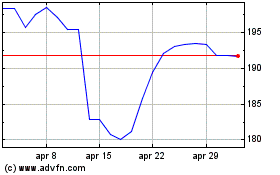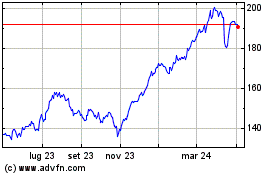By Maureen Farrell and Eliot Brown
This article is being republished as part of our daily
reproduction of WSJ.com articles that also appeared in the U.S.
print edition of The Wall Street Journal (October 23, 2019).
SoftBank Group Corp. said it agreed to take a majority stake in
WeWork after securing a deal that could hand co-founder Adam
Neumann a nearly $1.7 billion windfall and sever most of his ties
with the troubled office-space startup.
WeWork, in danger of running out of cash in the coming weeks,
chose a rescue offer from SoftBank over a competing proposal from
JPMorgan Chase & Co., according to people familiar with the
matter. It had asked both parties to submit proposals by a deadline
Monday.
The deal, which the companies announced late Tuesday, values
WeWork at about $8 billion, a far cry from what it was aiming for
in an initial public offering earlier this year and even less than
the $47 billion at which a January investment from SoftBank pegged
its worth. It will give SoftBank a roughly 80% ownership stake in
WeWork.
Mr. Neumann, who was forced out as chief executive after
pushback from prospective investors scuttled the IPO, has the right
to sell $970 million of shares, or about one-third of his stake, in
a so-called tender offer in which SoftBank will buy up to $3
billion in WeWork stock from employees and investors.
The Japanese conglomerate, which already owns about a third of
the company, will also extend Mr. Neumann credit to help him repay
a $500 million loan facility led by JPMorgan, the people said. It
will also pay him a $185 million consulting fee.
Mr. Neumann has promised to work exclusively with the company
for four years, some of the people said. Mr. Neumann, who has
remained chairman of WeWork parent We Co., will step down from the
board but remain an observer and hold a minority stake.
The money Mr. Neumann will receive on his way out, which he has
told people he sees as a validation of the job he did building the
company, is likely to raise hackles among employees, governance
experts and others. Mr. Neumann had previously sold hundreds of
millions of dollars of his stock in the company and borrowed
heavily against it.
While he will walk away a billionaire, most We employees are
left holding stock options that are underwater at the roughly
$20-a-share valuation implied by the SoftBank deal, according to
former executives familiar with the compensation packages. That
leaves them with little beyond their salaries and -- for thousands
set to be laid off -- any severance.
A top SoftBank executive, Marcelo Claure, will succeed Mr.
Neumann as executive board chairman, WeWork said. The Bolivian-born
former CEO of Sprint Corp., who is said to be close to Mr. Neumann,
also is expected to head a search for outside leadership, including
potentially a new chief executive to replace the two men who have
been sharing the job since Mr. Neumann's departure. The board will
be expanded and it will assume voting control of Mr. Neumann's
shares, the companies said.
SoftBank is racing to save an investment that has soured in
rapidly. Its founder, Masayoshi Son, was a major booster of Mr.
Neumann, and the Japanese-listed conglomerate invested several
times in WeWork, both on its own and through its $100 billion
Vision Fund, which includes outside investors.
On a call with some of those investors this week, Mr. Son
apologized for the WeWork investment, saying he had put too much
faith in Mr. Neumann, people familiar with the matter said.
SoftBank will also move up a $1.5 billion investment it had been
scheduled to make next year and extend the company a $5 billion
loan.
Between 2017 and earlier this year, SoftBank put more than $9
billion into WeWork at a roughly $24 billion valuation, according
to analysts at Sanford C. Bernstein & Co. What SoftBank has
agreed to add would bring its total equity investment to more than
$13 billion for a company now worth less than $8 billion.
Mr. Neumann, who co-founded WeWork in 2010, once owned shares
that carried 20 votes each, guaranteeing him ironclad control of
the company, even as new investors came in. The SoftBank deal would
require that all We shares carry one vote apiece. Mr. Neumann's
stake in the company is expected to fall to below 10% after he
sells shares.
SoftBank's $500 million loan to Mr. Neumann was a critical part
of the negotiations, as he previously borrowed against his stock at
a much higher valuation. With the company's worth plummeting, he
was in danger of falling below the collateral levels required by
JPMorgan and other banks.
By relinquishing the CEO title in late September, Mr. Neumann
was in technical default on that loan, which could have forced
imminent repayment, according to people familiar with the matter.
JPMorgan gave him 45 days to work out a solution. The new money
from SoftBank will allow Mr. Neumann to repay the loans and spare
JPMorgan -- which prides itself on a "fortress balance sheet" and
savvy lending decisions -- from suffering a major credit loss.
WeWork's swift fall erased nearly $40 billion on paper, a
collapse with little precedent among startups. Just five weeks ago,
WeWork was planning an IPO that its bankers at JPMorgan and Goldman
Sachs Group Inc. told company executives could fetch a valuation
around $20 billion.
Investors balked at the company's steep and growing losses and a
tangle of business and personal dealings with Mr. Neumann, whose
erratic management style and party-heavy lifestyle also raised
eyebrows.
Under its new co-CEOs, Artie Minson and Sebastian Gunningham,
WeWork has been crafting plans to sell or shut down side ventures,
including a private elementary school and the event-planning
website Meetup.com, to focus on its core business of leasing office
buildings, renovating them and subletting to short-term
tenants.
WeWork also has been planning to cut thousands of employees, but
delayed the layoffs earlier this month because it couldn't afford
the severance costs, people familiar with the matter have said.
A big aim of these moves is to pare down WeWork's cost structure
now that it will have to make do, at least for now, without the $3
billion or more the IPO was expected to bring in.
With the company's value now reset at around $8 billion, most of
the investment in the company since its inception is underwater and
many investors will likely have to mark down their stakes.
SoftBank, Fidelity Management and Chinese investment firm Hony
Capital bought shares at prices far above the valuation implied by
the pending SoftBank transaction, regulatory filings show.
A few winners: A 2012 investment of $17 million led by
venture-capital firm Benchmark Capital is now worth more than 40
times that amount, and a $150 million investment in 2014 led by
JPMorgan's asset-management division is worth roughly four times as
much.
--Liz Hoffman and Rolfe Winkler contributed to this article.
Write to Maureen Farrell at maureen.farrell@wsj.com and Eliot
Brown at eliot.brown@wsj.com
(END) Dow Jones Newswires
October 23, 2019 02:47 ET (06:47 GMT)
Copyright (c) 2019 Dow Jones & Company, Inc.
Grafico Azioni JP Morgan Chase (NYSE:JPM)
Storico
Da Mar 2024 a Apr 2024

Grafico Azioni JP Morgan Chase (NYSE:JPM)
Storico
Da Apr 2023 a Apr 2024
